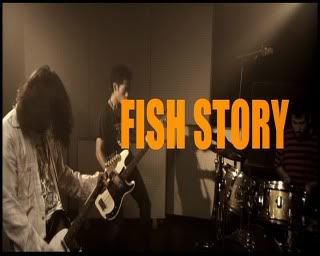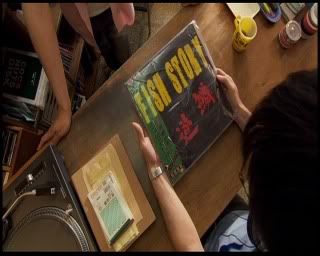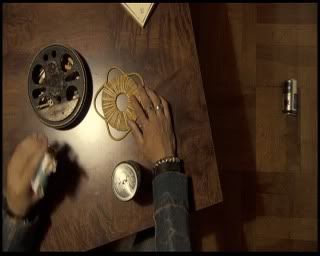
The blurb on the back of the DVD cover reads: "FISH STORY weaves together several seemingly separate storylines taking place at different points in time over a 37-year span to explain how a little punk rock song can save the world." That's an intriguing premise, for sure. Can a song save the world? If you're going into this film, you're probably thinking, "yes, yes it can," since it's unlikely that someone will make a film about how a song can't save the world. And you'd be right.

What's perhaps quite surprising is the way that the song--performed by Gekirin (Wrath) and entitled "Fish Story"--manages to pull off this particular bit of salvation. This isn't a metaphoric or poetic saving of the world; people don't get together to sing it, fighting back injustice, oppression, etc., in the face of adversity. No, "Fish Story," the song, manages to directly influence events in just such a way that Earth's inevitable demise is staved off. Thank god for that.
But I'm getting ahead of myself. FISH STORY begins in 2012, with a comet hurdling towards Earth. This isn't the same premise as ARMAGEDDON--this is a deliberate ripoff of ARMAGEDDON. Even the plan to save the world is similar. In any event, instead of worrying about the future, one young man decides to go to the record store, and pick up an old album, which features--you guessed it!--"Fish Story." And so the tale of that song begins to unfold...

First we travel back to 1982, where a shy and submissive young'un named Masahi is introduced to "Fish Story" by his incredibly annoying and abusive 'friends.' Masahi (Gaku Hamada), chauffeuring his friends to a rendezvous, overhears that "Fish Story" is haunted; indeed, it has 60 seconds of silence, right in the middle of the track. The tape (remember, this is the 80s) warns that this isn't an error--the silence is deliberately there. But, his friend explains, some people don't hear silence. Some hear a woman screaming! And if you happen to be that someone, well, watch out, cuz your days are numbered. Not only is this a great urban legend, but it sounds exactly like the plot of so many recent J-horrors.
So, what happens to Masahi? Unfortunately, this is one of those films where, to explain it, I'd essentially be ruining the ending. You're not provided with the end of Masahi's story, before we time-travel to 2009, and a mini action movie/love story set on a boat, with a hero who has been specially trained (since birth) to fuck dudes up. Kind of like Steven Seagal's UNDER SEIGE. But not as good. And then--whiz, bang--we're back in 1975, to see how "Fish Story" was recorded in the first place. All the while, we keep checking back in to 2012, where--you guessed it!--a group of international astronauts have hatched a scheme to explode that naughty comet. Way to go, fellas!

Far and away the strongest part of the film is the final, oldest story: the 1975 genesis of the song that the whole movie revolves around. The actors are believable as a band, and not only a band, but a punk rock band. And that's hard to pull off; an actor with some ratty clothes and funny hair usually just looks like a fucking poser. More to the point, the actual song, "Fish Story," is an incredibly catchy piece of punk rock.
As you can probably tell, none of the individual sections of the movie provide the viewer with anything new. The journey of a submissive guy growing a pair, a hostage-taking and ass-kicking scenario, an unpopular band fighting to find its voice, a doomed planet--this is all tried and true stuff. Yoshihiro Nakamura's FISH STORY succeeds above all odds, because somehow it does make it all work. But you have to wait until the very last moment of the film. Until then, everything just kind of hangs there, tenuously. The film isn't helped by the fact that it, like a few recent Japanese films I've encountered (I'm thinking of LOVE EXPOSURE) looks like it was shot on the cheap, for a local cable channel. OK, that's probably an exaggeration; the best I can say is that the film itself doesn't look cinematic. It looks more like a soap opera. Still, FISH STORY tells a good yarn; like its namesake, a very regular tale (the story of a song) becomes bigger. And bigger. And bigger...










No comments:
Post a Comment